上海牛津小学英语语法知识复习课程
Unit3语法知识点讲解牛津上海版英语六年级下册

6BU3 语法知识点讲解I.词性转换:sad—sadder—saddest sadly ( adv. )celebrate—celebrationadvice “劝告, 忠告” (un)advise (v.) advise sb. to do sth.a piece of advice 一条建议some advice 一些建议give advice to sb. 想某人提出建议=give somebody advicetake sb’s advice /follow his advice 采纳某人的建议II.语法:1. the fifth day of the fifth lunar month 在阴历五月初五solar 太阳的连接时间的介词:in: duration用于年,月,季节前/ in the morning / afternoon / evening / in the century on: on Wednesday / on New Year’s Day / on a cold morning / a hot day /on the evening of February 2nd. / on a fine night /on Sunday night / etc.On a rainy eveningat: time point at 7 o’clock) / at noon (midday) / night / midnight on a clear midnight 不加介词:this / that / one + 时间(morning / Sunday morning / spring)2.His job was to give advice to the king. 他的工作是给国王出谋划策。
be +to do, 不定式做表语,类似的主语有one’s wish, hope, ambition, plan, job + is + to do sth.e.g. His plan is to clean the room. 他的任务是打扫房间。
上海秋季牛津英语五年级上册五上M1U2同步讲义教案(含词汇语法练习)
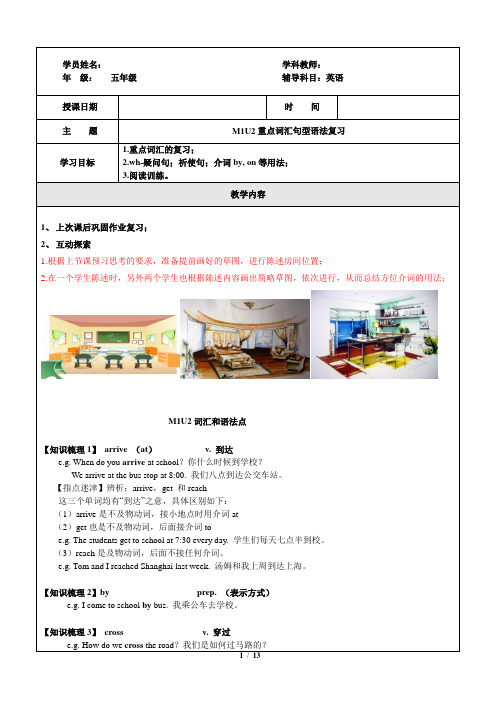
1、上次课后巩固作业复习;2、互动探索1.根据上节课预习思考的要求,准备提前画好的草图,进行陈述房间位置;2.在一个学生陈述时,另外两个学生也根据陈述内容画出简略草图,依次进行,从而总结方位介词的用法;M1U2词汇和语法点【知识梳理1】arrive (at)v. 到达e.g. When do you arrive at school?你什么时候到学校?We arrive at the bus stop at 8:00. 我们八点到达公交车站。
【指点迷津】辨析:arrive,get 和reach这三个单词均有“到达”之意,具体区别如下:(1)arrive是不及物动词,接小地点时用介词at(2)get也是不及物动词,后面接介词toe.g. The students get to school at 7:30 every day. 学生们每天七点半到校。
(3)reach是及物动词,后面不接任何介词。
e.g. Tom and I reached Shanghai last week. 汤姆和我上周到达上海。
【知识梳理2】by prep. (表示方式)e.g. I come to school by bus. 我乘公车去学校。
【知识梳理3】cross v. 穿过e.g. How do we cross the road?我们是如何过马路的?【知识拓展】cross作动词,意为“横穿”,如:横穿马路cross the road,横穿大桥cross the bridgee.g. Be careful when we cross the street. 当我们过马路时要小心。
【知识梳理4】get off 从···下来e.g. He gets off the train at Park Street. 他在公园街站下了火车。
We will get off the bus at the next stop. 我们将在下一站下车。
上海秋季牛津英语三年级上册三上期中复习M1M2同步讲义教案(含词汇语法练习)
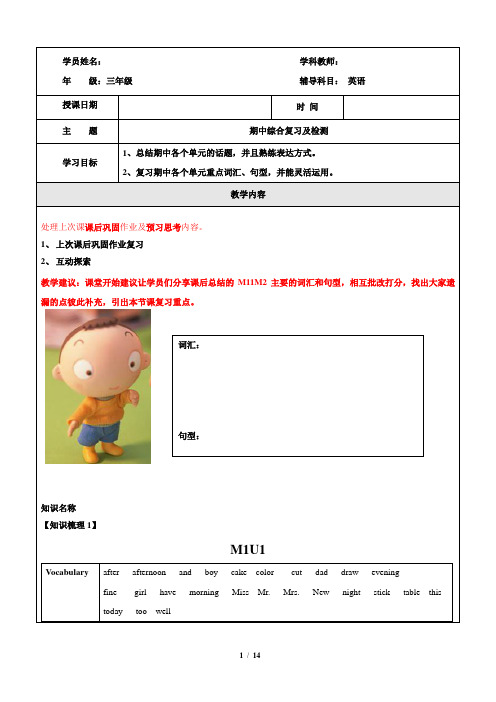
学员姓名:学科教师:年级:三年级辅导科目:英语授课日期时间主题期中综合复习及检测1、总结期中各个单元的话题,并且熟练表达方式。
学习目标2、复习期中各个单元重点词汇、句型,并能灵活运用。
教学内容处理上次课课后巩固作业及预习思考内容。
1、上次课后巩固作业复习2、互动探索教学建议:课堂开始建议让学员们分享课后总结的M11M2主要的词汇和句型,相互批改打分,找出大家遗漏的点彼此补充,引出本节课复习重点。
词汇:句型:知识名称【知识梳理1】M1U1Vocabulary after afternoon and boy cake color cut dad draw eveningfine girl have morning Miss Mr. Mrs. New night stick table thistoday too wellExpression Hello! Good evening! I’m fine!Good morning! Good night! Fine, thanks.Good afternoon! How are you?Grammar —GreetingDifferent culture1. How are you?2. Good morning!3. Hello!Grammar—人称代词单数复数我你他她它我们你们他们I you he she it we you theyI am you are he is she is it is we are you are they areI’m You’re He’s She’s It’s we’re you’re they’re___________________________________.1.Don’t open the door.2.Don’t be noisy!【知识梳理3】M1U3bird birthday blow eight five four guess here nine no only Vocabularyone party seven six ten three two yummyExpression How old are you? Happy Birthday! Here you are!Grammar—基数词CBB1.candy2.evening3.I am4.hi5.they are6.yourIII.FTTTFFIV.DBHGECFAV.BBCBAABAVII.1.How old are you? 2.What is her name?VIII.your, Thanks, to you, Blow, OK,Cut, you are, is.教学建议:1、老师引导学生针对达标检测错题进行反思和总结;2、老师引导学生对精讲提升相关知识进行总结,可采用表格、思维导图等形式呈现。
三年级第二学期牛津英语语法复习

三年级第二学期牛津英语语法复习一.词1. 名词专有名词(1)spring, summer, autumn, winter前不加the(2)Shanghai 等地名前不加the(3)Sun, cloud, wind前加the2.名词的复数形式可数名词变复数(1)一般情况在名词的词尾加”s”cow-----cows book-----bookss在清辅音音素如/k/, /p/等后发/s/,在浊辅音音素后如/g/,/b/,/l/,/m/等后面发/z/. (2)辅音字母+y结尾的闽此,将y变成i加esfly------flies元音字母+y结尾的名词,直接加“s”boy----boys day-----days(3)以s,x, ch, sh结尾的名词,在词尾加esglass-----glasses box-----boxes词尾es发/iz/,如class(4)以f,fe结尾的名词,有些在词尾直接加sroof-----roofs有些将f或fe改为v 再加esknife-----knives leaf-----leaves(5)不规则变化child------children man-----menfoot-----feet mouse-----micetooth------teeth(6)名词单复数同形Chinese sheep deer fish2.物主代词3.冠词a,an,the(1)an 用在元音因素的名词前面an apple(2)体育运动前不用theplay football4. 副词and,but(1)and表示和,连接同类词red and black(2)but表示转择,意思发生变化I like it ,but it’s hot.5.情态动词can(1)表示会,能I can write.He can jump(2)can +动词原形6.正反义词fat----- thin young-----old new-----old tall------short long-----short big-----small hot-------cold warm----cool wet-----dry smooth -----rough hard-----soft sour-----sweet 二.句型1. to beThis is a book(复数)This is these areThat is those areIt is they are2.to haveI hehave she has You itthey xx3.there be(1)There is用于单数句和不可数名词(2)There are用于名次复数4.Like(1)like to+动词原形I like to sing.(2)like+动名词I like singing.(3)第一、二人称用like,第三人称用likesHe likes to eat fish(4)疑问句与否定句转换Do you like…..Does he like…I don’t like…..He doesn’t like…5.祈使句(1)动词原形,第二人称主语you 一般省去Open the door!Don’t open the door(2)第一、三人称Let us/ Let’s/ Let+第三人称名词或代词+动词原形Let me go to schoolLet’s play football.6. 特殊疑问句(1) what 什么This is a book. What is it?/What are they?I like flowers. What do you like?My name is Jane. What ‘s your name? It’s red. What colour is it?It’s summer. What season is it?It’s five o’clock. What time is it? (2)who 谁He is Peter. Who is he? (3)which 哪一个which season do you like?(4)how 怎么How old are you ?/How old is he? How are you ?(5)where 哪里It’s on the desk. Where is it?。
“牛津上海版”小学英语二年级(上)知识点大全
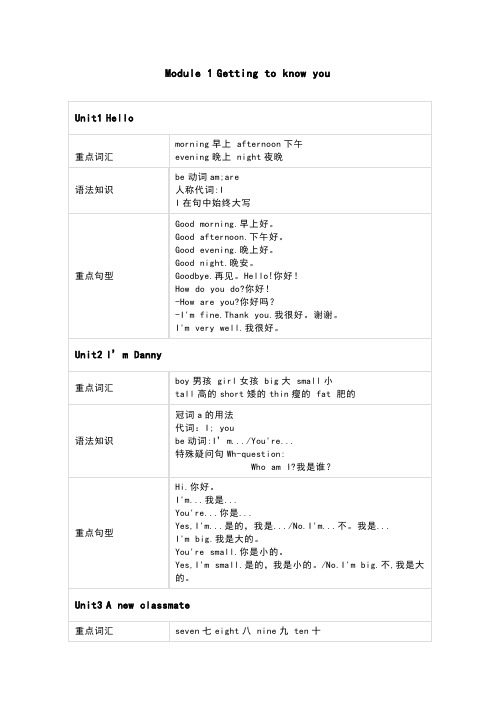
Unit2 That's my family
重点词汇 语法知识 重点句子
young 年轻的 old 老的 kind 体贴的 nice 友好的 sweet 惹人喜爱的 jar 罐子 t 昆虫
人称代词:she,he 物主代词:my,your 一般疑问:Is he/she...?
Yes,he/she is. No,he/she isn't. be 动词:He/She is... 特殊疑问句:Wh-question:
可数名词-复数 介词:in.on,under 特殊疑问句:How many...? There be 句型:There is/are... 祈使句:Give me...,please.
No,thanks.不需要,谢谢。 Yes,please.是的,请给我。 Here you are.给你。 Dinner is ready.晚餐准备好了。 I'm coming.我来了。 Give me a plate,please.请给我一个盘子。 How many bowls?多少碗? There are four bowls.有 4 个碗。 How many spoons?多少勺子? There is one.有一个勺子。 There is a table and a chair in the room.房间里 有一张桌子和一把椅子。 There are two bowls on the table.桌子上有两个碗。 Ginger is under the chair.生姜在椅子下面。 He's sitting under the chair.他在椅子下面坐着。
Unit3 A new classmate
重点词汇
seven 七 eight 八 nine 九 ten 十
上海版牛津英语 4A 语法总复习

25. Danny ____________ (study) English, Chinese, math, science and art at school.
26. Mike sometimes __________ (go) to the park with his sister. 27. At eight at night, she ____________ (watch) TV with her parents.
改错(划出错误的地方,将正确的写在横线上) 1. Is your brother speak English? __________________ 2. Does he likes going fishing? __________________ 3. He likes play games after class. __________________ 4. Mr. Wu teachs us English. __________________
牛津英语4A 语法总复习
1.be 动词的一般现在时的句式: 肯定句:主语+be+其他.
否定句:主语+be+ not+其他.
e.g. He is a worker. You are thirteen. They are in the classroom. e.g. He is not a worker. You aren’t thirteen. They aren’t in the classroom. e.g. Is he a worker? Yes, he is./No, he isn’t. Are you thirteen? Are they in the classroom? Yes, they are. No, they aren’t. e.g. What is he? What colour is that bird? How old are you? Where are they ?
上海版牛津小学英语:5A-Module-2-语法知识(1)how-often
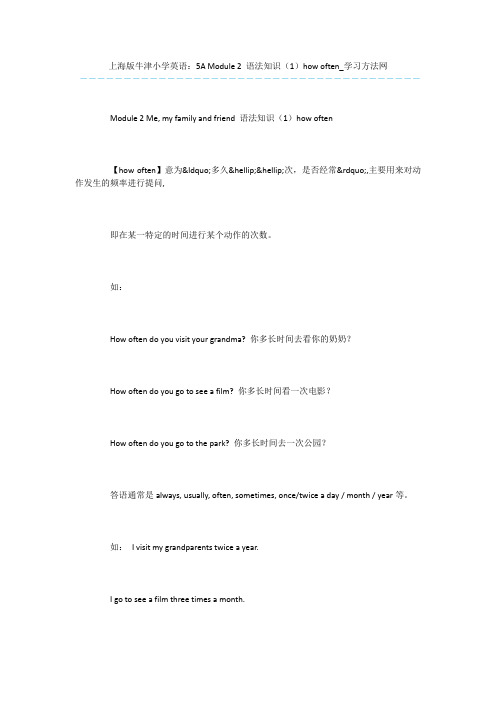
上海版牛津小学英语:5A Module 2 语法知识(1)how often_学习方法网
---------------------------------------Module 2 Me, my family and friend 语法知识(1)how often
【how often】意为“多久……次,是否经常”,主要用来对动作发生的频率进行提问,
即在某一特定的时间进行某个动作的次数。
如:
How often do you visit your grandma? 你多长时间去看你的奶奶?
How often do you go to see a film? 你多长时间看一次电影?
How often do you go to the park? 你多长时间去一次公园?
答语通常是always, usually, often, sometimes, once/twice a day / month / year等。
如:I visit my grandparents twice a year.
I go to see a film three times a month.
【练一练】
___do you visit your grandparents? I visit them twice a month.
A. How long
B. How many
C. How often
D. How soon
感谢阅读,欢迎大家下载使用!。
小学牛津英语语法大全(20讲)

小学牛津英语语法大全第1讲字母......................... ................................................. (01)第2讲语音......................... ................................................. . (06)第3讲名词......................... ................................................. . (07)第4讲冠词......................... ................................................. (09)第5讲代词......................... ................................................. (10)第6讲形容词......................................................................... . (12)第7讲副词......................... ................................................. (13)第8讲介词......................... ................................................. (13)第9讲数词......................... ................................................. (15)第10讲连词......................... ................................................. (16)第11讲动词......................... ................................................. (17)第12讲一般现在时................................................................ (18)第13讲现在进行时................................................................ .. (19)第14讲一般过去时................................................................ .. (19)第15讲一般将来时................................................................ .. (20)第16讲句法......................................................................... . (21)第17讲听力......................... ................................................. . (23)第18讲话题......................... ................................................. . (24)第19讲构词法...................................................................... .. (26)第20讲英美文化识............................................................. . (27)第1讲字母1. 英语中共有26个字母。
上海三年级(上)英语牛津 语法复习和答案
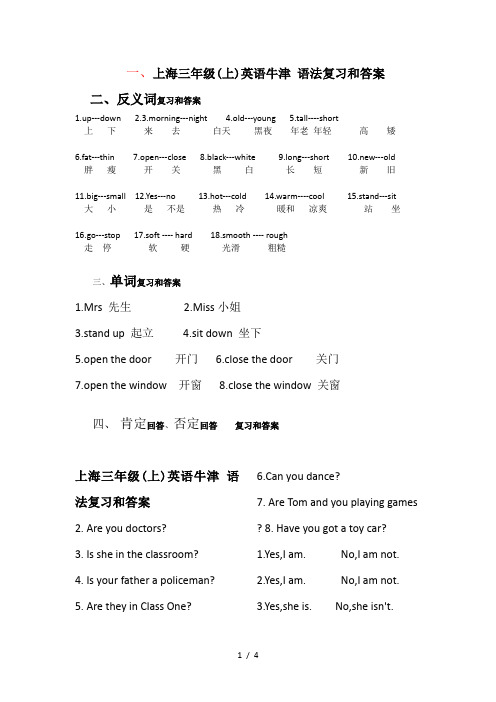
一、上海三年级(上)英语牛津语法复习和答案二、反义词复习和答案1.up---down2.3.morning---night4.old---young5.tall----short上下来去白天黑夜年老年轻高矮6.fat---thin7.open---close8.black---white9.long---short 10.new---old 胖瘦开关黑白长短新旧11.big---small 12.Yes---no 13.hot---cold 14.warm----cool 15.stand---sit 大小是不是热冷暖和凉爽站坐16.go---stop 17.soft ---- hard 18.smooth ---- rough走停软硬光滑粗糙三、单词复习和答案1.Mrs 先生2.Miss小姐3.stand up 起立4.sit down 坐下5.open the door 开门6.close the door 关门7.open the window 开窗8.close the window 关窗四、肯定回答、否定回答复习和答案上海三年级(上)英语牛津语法复习和答案2. Are you doctors?3. Is she in the classroom?4. Is your father a policeman?5. Are they in Class One?6.Can you dance?7. Are Tom and you playing games ? 8. Have you got a toy car?1.Yes,I am. No,I am not.2.Yes,I am. No,I am not.3.Yes,she is. No,she isn't.4.Yes,he is. No,he is.5.Yes,they are. No,they aren't.6.Yes,I can. No,I can't .7.Yes,we are. No,we aren't.8.Yes,I have. No,I haven't.上海三年级(上)英语牛津语法复习和答案9.Yes,she has. No,she hasn't.10.Yes,he has. No,he hasn't.上海三年级(上)英语牛津语法复习和答案第一步;一定要有Yes 和No第二步;你换成我; 比如Are you Peter?Yes, I am.你是皮特吗?是的;我是注意:只有‘你’换成‘我’;其他直接第三步第三步;回答倒过来。
“牛津上海版”小学英语五年级(下)知识点大全
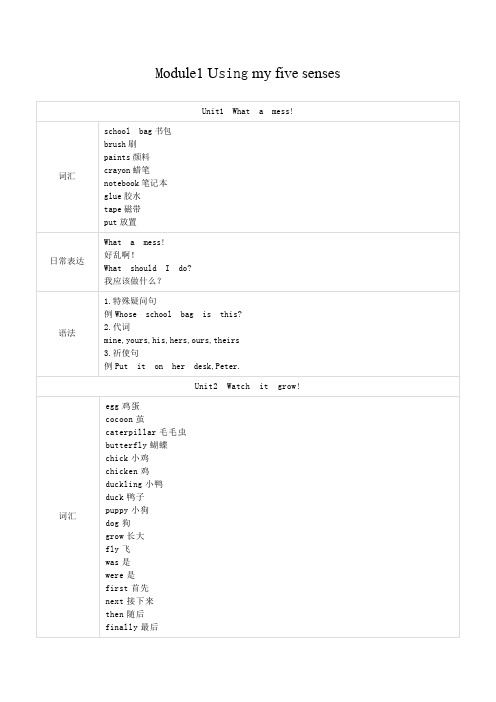
M odule1U sing my five sensesUnit1What a mess!词汇school bag书包brush刷paints颜料crayon蜡笔notebook笔记本glue胶水tape磁带put放置日常表达What a mess!好乱啊!What should I do?我应该做什么?语法1.特殊疑问句例Whose school bag is this?2.代词mine,yours,his,hers,ours,theirs3.祈使句例Put it on her desk,Peter.Unit2Watch it grow!词汇egg鸡蛋cocoon茧caterpillar毛毛虫butterfly蝴蝶chick小鸡chicken鸡duckling小鸭duck鸭子puppy小狗dog狗grow长大fly飞was是were是first首先next接下来then随后finally最后语法1.一般过去时例It was a white egg.2.一般现在时例Now it is a green caterpillar.Unit3How noisy!词汇drill钻(孔);打(眼)lorry卡车motorbike摩托车outside外面sleep睡觉another另外的noise噪音heard听到sat坐日常表达Not at all.一点也不。
语法1.特殊疑问句例What’s that noise?What can you hear?2.一般过去时例Kitty wanted to read a book.M odule2M y favourite thingsUnit1Food and drinks词汇meat肉pork猪肉beef牛肉chicken鸡肉fish鱼肉fruit水果vegetable蔬菜tomato西红柿potato土豆carrot胡萝卜cabbage卷心菜bean豆子rice米饭noodles面条bread面包water水milk牛奶tea茶orange橙子grape葡萄apple苹果banana香蕉drink饮料milk牛奶had有eat吃healthy健康的did做keep...away远离日常表达...is/are my favourite food.是我最喜欢的食物。
期末语法复习(知识清单)牛津上海版(试用本)英语四年级上册
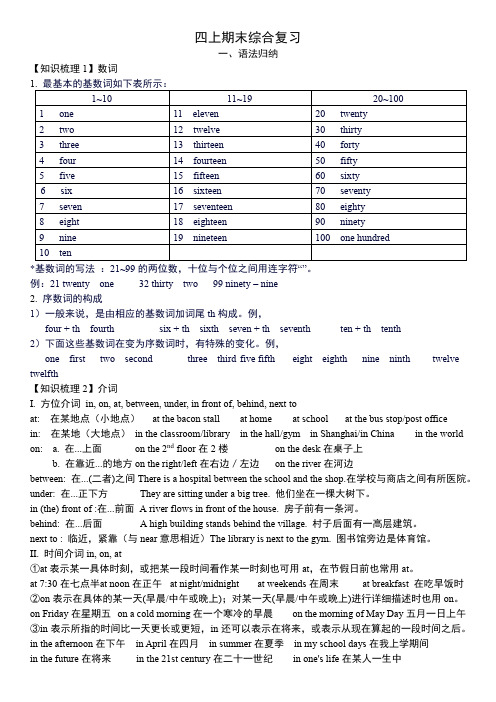
四上期末综合复习一、语法归纳【知识梳理1】数词*基数词的写法:21~99的两位数,十位与个位之间用连字符“”。
例:21 twenty one 32 thirty two 99 ninety – nine2. 序数词的构成1)一般来说,是由相应的基数词加词尾th构成。
例,four + th fourth six + th sixth seven + th seventh ten + th tenth2)下面这些基数词在变为序数词时,有特殊的变化。
例,one first two second three third five fifth eight eighth nine ninth twelve twelfth【知识梳理2】介词I. 方位介词in, on, at, between, under, in front of, behind, next toat: 在某地点(小地点)at the bacon stall at home at school at the bus stop/post officein: 在某地(大地点)in the classroom/library in the hall/gym in Shanghai/in China in the world on: a. 在...上面on the 2nd floor在2楼on the desk在桌子上b. 在靠近...的地方on the right/left在右边/左边on the river在河边between: 在...(二者)之间There is a hospital between the school and the shop.在学校与商店之间有所医院。
under: 在...正下方They are sitting under a big tree. 他们坐在一棵大树下。
in(the) front of:在...前面A river flows in front of the house. 房子前有一条河。
牛津沪教版英语六年级下基础语法复习
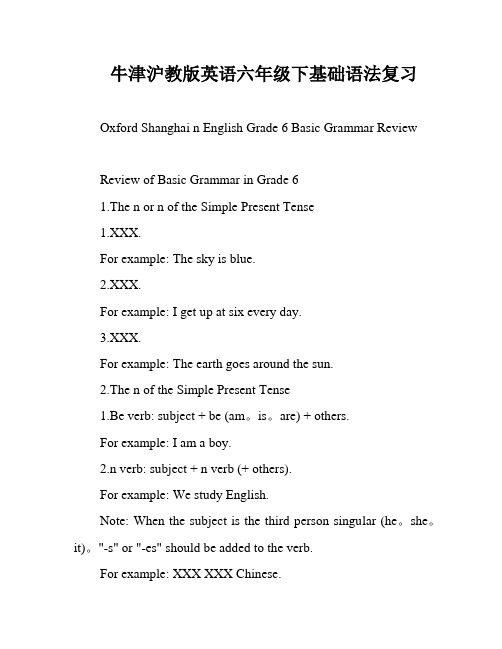
牛津沪教版英语六年级下基础语法复习Oxford Shanghai n English Grade 6 Basic Grammar ReviewReview of Basic Grammar in Grade 61.The n or n of the Simple Present Tense1.XXX.For example: The sky is blue.2.XXX.For example: I get up at six every day.3.XXX.For example: The earth goes around the sun.2.The n of the Simple Present Tense1.Be verb: subject + be (am。
is。
are) + others.For example: I am a boy.2.n verb: subject + n verb (+ others).For example: We study English.Note: When the subject is the third person singular (he。
she。
it)。
"-s" or "-es" should be added to the verb.For example: XXX XXX Chinese.Rules for the third person singular form of the verb1.In general。
add -s directly。
such as: cook-cooks。
walk-walks2.Ending in s。
x。
sh。
ch。
or o。
add -es。
such as: guess-guesses。
wash-washes。
watch-watches。
go-goes3.XXX + y。
2019六年级上册英语语法课件期末复习2牛津上海版(一起)(共19张PPT).doc

六年级上册英语语法课件期末复习2牛津上海版(一起)(共19张PPT)Show Time- ---sharing your stores 正能量积极1. ---May I tuch this? ---No, you mustn't. --- Why ? ---Because it's hot.2.---Shall we go now? ---OK! Let's go.祈使句 3 03 4 04 2 02 5 05 连词-because 介词 6 06 形容词副词比较级 0 0 1 1must / mustnt 必须/不允许,表示:义务和禁止,后面需跟动词原形表示禁止戒要求不做某事时我们还可以用Dont十动词原形must提到主语前面 We must study hard. We mustnt talk loudly in the library. Dont talk loudly in the library. ---Must I bring books to you today? ---Yes,you must/No, you neednt 1.我们必须努力学习。
2.我们禁止在图书馆大声说话。
3.We mustnt talk loudly in the library.(改为祈使句)4.---我们必须今天把书带给你吗?---是的,你必须/不,你不必。
5.他一定在房间里,因为房间灯是亮的。
Must 用法 We must keep quiet in the library. We mustn't smoke in public. -MustI finish the homework now? He must be ill. He looks so paleeg1. Shall we go to school? eg2. May I come in, Mrs. Li? eg3.You may be right .g4. Would you pass me the book? shall may would 表征求意见 eg1.Shall we go to school?表许可和推测 eg2. May I come in, Mrs. Li? eg3.You may be right. 表请求、建议 eg4. Wouldyou pass me the book?because because +句子表示因为,用来回答why提问的原因 because of +名词或动名词,表示因为;由于 eg. I don't like swimming because it's dangerous. 因为他受伤的腿,他走的很慢。
- 1、下载文档前请自行甄别文档内容的完整性,平台不提供额外的编辑、内容补充、找答案等附加服务。
- 2、"仅部分预览"的文档,不可在线预览部分如存在完整性等问题,可反馈申请退款(可完整预览的文档不适用该条件!)。
- 3、如文档侵犯您的权益,请联系客服反馈,我们会尽快为您处理(人工客服工作时间:9:00-18:30)。
上海牛津小学英语语法知识总结一般现在时1、定义:表示经常发生或习惯性的动作、状态。
句中通常有usually,often,every day,sometimes,always,at weekends,on Sundays等表示经常性时间的短语。
2、构成:1)当谓语是be动词时,一般现在时的构成:主语+be动词+其他如:I am a student. He is Jim’s father. They are from Japan.2)当谓语是行为动词时,一般现在时的构成:①主语(非第三人称单数)+动词原形+其他如:I often watch TV at the weekends.Mr Green and Mrs Green like collecting stamps.②主语(第三人称单数)+动词的第三人称单数形式+其他如:Jim usually visits his grandparents on Sundays.She sometimes goes to the park with her mother.swim-swims,watch-watches,do-does如:study-studies,fly-flies1、定义:表示现在或现阶段正在进行或发生的动作。
句中常有now,look,listen等词。
如:I am washing clothes now. Look! Liu Tao is climbing the tree.Listen! Jane is singing in the music room.2、构成:be动词(am/is/are)+ 动词现在分词(V-ing),drink-drinking,eat-eating,look-looking 如:write-writing,make-making,ride-riding,take-taking如:sit-sitting,swim-swimming,put-putting,run-running,stop-stopping,get-getting,begin-beginning,jog-jogging,forget-forgetting4、动名词其实就是动词的现在分词,它既有名词性质(可作主语),又有动词性质(可带宾语)。
如:Asking the way My hobby is collecting stamps. He is good at skating.一般将来时1、定义:表示将要发生的动作或存在的状态,以及打算、计划或准备某事。
句中一般含有表示将来的时间状语,如:tomorrow morning,next week,this afternoon等表示将来的时间状语。
2、构成:①be gong to +动词原形如:I am going to see a Beijing opera tomorrow.We are going to meet at bus stop at half past ten.Dad and I are going to see a Beijing opera this afternoon.②will +动词原形如:They will go swimming this afternoon.3、be going to 和will 区别:①be going to表示经过事先安排、打算或决定要做的事情,基本上一定会发生;will则表示有可能去做,但不一定发生,也常表示说话人的临时决定。
如:I am going to take part in a party this evening.They are cleaning the library now. I’ll go and join them.②be going to表示近期或眼下就要发生的事情;will表示的将来时间则较远一些。
如:He is going to write a letter tomorrow. I will meet her one day.③be going to还可以用来表示有迹象表明某件事将要发生,常用于天气等自然现象。
如:Look! It’s going to rain.句法1、陈述句说明事实或陈述说话人观点的句子。
基本结构:主语+谓语+其他1)肯定陈述句We all like pandas very much.2)否定陈述句He doesn’t do housework at weekends3)肯定陈述句改否定陈述句①一般是在be动词或情态动词后加not。
Mary was at school yesterday. —> Mary was not at school yesterday.I can make a model plane. —>I can not make a model plane.②不含be动词或情态动词的,行为动词前要用助动词的否定式(don’t,doesn’t,didn’t),后面跟动词的原形。
He likes drawing pictures.—>He doesn’t like drawing pictures.I went to the park yesterday. —>I didn’t go to the park yesterday.4)陈述句改一般疑问句①有be动词或情态动词的,把be动词或情态动词提前。
Mary was at school yesterday. —> Was Mary at school yesterday?I can make a model plane. —> Can you make a model plane?②不含be动词或情态动词的句子,借助助动词开头,动词还原成原形。
He likes drawing pictures.—>Does he like drawing pictures.I went to the park yesterday. —>Did you go to the park yesterday?2、疑问句用来提出问题,询问情况的句子,末尾用问号。
1)一般疑问句:一般疑问句常用来询问一件事是否属实,通常以be动词,助动词或情态动词开头,用yes或no来回答,因此又叫是非疑问句,通常读升调。
—Is Mr Green from the UK? —Yes,he is. / No,he isn’t.—Do you have any hobbies? —Yes,I do. / No,I don’t.—Can you play the guitar? —Yes,I can. / No,I can’t.2)特殊疑问句:以特殊疑问词引导,要求回答具体问题,不能用yes或no来回答。
—How do you go to work every day? —I go to work by car.3)选择疑问句:提供两种或两种以上情况,让对方选择,往往用or连接。
—Would you like some tea or coffee? —Some coffee, please.4)反意疑问句:反意疑问句是由陈述句和附在其后的附加疑问句组成。
—It’s a fine day, isn’t it? — Yes ,it is.3、祈使句表示请求或命令别人做某事或不做某事。
1)用于第二人称,通常省略you。
①肯定祈使句:Open the door, please.②否定祈使句:Don’t be late again.2)用于第一人称和第三人称,通常以let(let后跟宾格)或shall开头。
Let me have a look. Let’s play a game now. Let him go home now.Shall we meet at one thirty in front of the Garden Theatre?4、感叹句表达喜怒哀乐等强烈感情,句尾常用感叹号(!),语气用降调。
1)what + 名词或名词性短语What a big garden (it is)!What an interesting storybook (it is) !What lovely weather (it is)!What pretty girls (they are)!2)how +形容词或副词+主语+动词How nice!How beautiful the flowers are!How tall Yao Ming is!5、there be 句型表示在某地有某人或某物。
1)主语是单数,be动词用is(was);主语是复数,be动词用are(were)。
There is some milk in the fridge.There are some peaches in the basket.2)如果有几个不同的人或物并列存在,be动词根据最靠近的那个名词而定。
There is a ruler and five knives in the pencil case.There are five knives and a ruler in the pencil case.3)there be句型和have/has区别:there be句型表示某地有某人或某物;have/has表示某人有某物。
has用于第三人称单数,其余人称和数用have。
There are some English books on the desk.I have some English books.一般过去时1、定义:表示过去某个时间里发生的动作或存在的状态。
常和表示过去的时间状语连用,如:a moment ago,just now,yesterday,last week,this morning等。
如:My brother often went to school by bike last term.The watch was beside the diary a moment ago.I watched the moon and ate the moon cakes last Mid-Autumn Festival.Jim went to the supermarket yesterday.2、构成:主语+动词的过去式+其他,cry-cried,plan-planned如:am/is-wasare-werehave/has-haddo-didgo-wentsit-sattell-toldsee-sawget-gotmake-madegive-gaveread-readbuy-boughtcome-camedraw-dreweat-atefly-flewmeet-metput-putrun-ransay-said sing-sangswim-swamtake-took。
